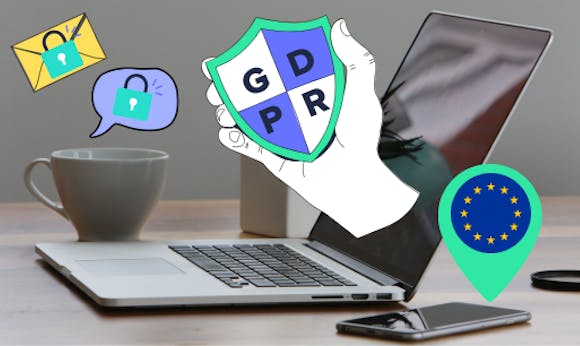
StartMail Stands With Our Privacy Allies Against the EU's Controversial Chat Control Bill
We founded StartMail in 2013 on the belief that every individual has a fundamental and irrevocable right to privacy. For a majority of that time, we have proudly held up our European heritage as vital to our commitment and practice of privacy for every user. Unfortunately, since May of 2022, Europe’s status as a privacy leader has been under threat by a misguided and disastrous proposal known as “Chat Control”, which seeks to mandate the scanning of all online communication to detect “child abuse material”.
In response, we've joined with our allies in the digital privacy community to urge the ministers of EU member states to defend Europe’s digital sovereignty and reject this draft law that will put children and everyone else at higher risk for exploitation and violate the legal and ethical boundaries of every confidential relationship that form the bedrock of a free society. And even though our alliance has just scored a major victory by convincing Germany to oppose the bill, our work is still far from over.
After you read the full letter below, we encourage each of you to take the following actions to help secure digital privacy rights across the EU and the globe:
- Contact Your MEP: Reach out to your Member of the European Parliament and express your opposition to the proposal. You can find your MEP and contact details here: Find Your MEP.
- Join the Privacy Movement: Support organizations that are actively campaigning against these privacy-invasive measures in Europe, such as European Digital Rights (EDRi) and the European Data Protection Supervisor (EDPS).
- Stay Informed: Sign up for newsletters from privacy-focused organizations and stay up-to-date with the latest developments, fundraising efforts, and community actions. Some of our favorite resources include the EDRi Newsletter and the EFF Newsletter.
- Spread the Word: Share information that you’ve learned about this issue with your network, raise awareness on social media, and encourage others to get involved in protecting and exercising their digital rights.
Open letter to EU Member States on the proposed CSA Regulation
Dear Ministers of the Interior, Justice, Digitalisation and Economy of EU Member States,
We, the undersigned European enterprises, as well as the European DIGITAL SME Alliance - which represents more than 4,000 digital SMEs across Europe, write to you with deep concern regarding the proposed Regulation on Child Sexual Abuse (CSA). Protecting children and ensuring that everyone is safe on our services and on the internet in general is at the core of our mission as privacy-focused companies. We see privacy as a fundamental right, one that underpins trust, security and freedom online for adults and children alike. However, we are convinced that the current approach followed by the Danish Presidency would not only make the internet less safe for everyone, but also undermine one of the EU’s most important strategic goals: progressing towards higher levels of digital sovereignty.
Digital sovereignty is Europe’s strategic future
In an increasingly unstable world, Europe needs to be able to develop and control its own secure digital infrastructure, services, and technologies in line with European values. The only way to mitigate these risks is to empower innovative European technology providers.
Digital sovereignty matters for two key reasons:
- Economic independence: Europe’s digital future depends on the competitiveness of its own businesses. But forcing European services to undermine their security standards by scanning all messages, even encrypted ones, using client-side scanning would undermine users’ safety online, rand go against Europe’s high data protection standards. Therefore European users - individuals and businesses alike - and global customers will lose trust in our services and turn to foreign providers. This will make Europe even more dependent on American and Chinese tech giants that currently do not respect our rules, undermining the bloc’s ability to compete.
- National security: Encryption is essential for national security. Mandating what would essentially amount to backdoors or other scanning technologies inevitably creates vulnerabilities that can and will be exploited by hostile state actors and criminals. For this exact reason, governments exempted themselves from the proposed CSA scanning obligations. Nevertheless, a lot of sensitive information from businesses, politicians and citizens will be at risk, should the CSA Regulation move forward. It will weaken Europe’s ability to protect its critical infrastructure, its companies, and its people.
The CSA Regulation will undermine trust in European businesses
Trust is Europe’s competitive advantage. Thanks to the GDPR and Europe’s strong data protection framework, European companies have built services that users worldwide rely on for data protection, security, and integrity. This reputation is hard-earned and gives European-based services a unique selling point Big Tech monopolies will never be able to match. This is one of the few, if not the only competitive advantage Europe has over the US and China in the tech sector but the CSA Regulation risks reversing this success.
This legal text would undermine European ethical and privacy-first services by forcing them to weaken the very security guarantees that differentiate European businesses internationally. This is particularly problematic in a context where the US administration explicitly forbids its companies to weaken encryption, even if mandated to do so by EU law.
Ultimately, the CSA Regulation will be a blessing for US and Chinese companies, as it will make Europe kill its only competitive advantage and open even wider the doors to Big Tech.
Contradictions weaken Europe’s digital ambitions
The EU has committed itself to strengthening cybersecurity through measures such as NIS2, the Cyber Resilience Act, and the Cybersecurity Act2. These policies recognize encryption as essential to Europe’s digital independence. The CSA Regulation, however, must not undermine these achievements by effectively mandating systemic vulnerabilities.
It is incoherent for Europe to invest in cybersecurity with one hand, while legislating against it with the other.
European SMEs will be hit the hardest
Small and medium-sized enterprises (SMEs) would be hit hardest if obliged to implement client-side scanning. Unlike large technology corporations, SMEs often do not have the financial and technical resources to develop and maintain intrusive surveillance mechanisms, meaning compliance would impose prohibitive costs or force market exit. Moreover, many SMEs build their unique market position on offering the highest levels of data protection and privacy; which particularly in Europe is a decisive factor for many to choose their products over the counterparts of Big Tech. Mandating client-side scanning would undermine this core value proposition of many European companies.
This will suffocate European innovation and cement the dominance of foreign providers. Instead of building a vibrant, independent digital ecosystem, Europe risks legislating its own companies out of the market.
For these reasons, we call on you to:
- Reject measures that would force the implementation of client-side scanning, backdoors, or mass surveillance of private communications, such as we currently see in the Danish proposal for a Council position on the CSA Regulation.
- Protect encryption to strengthen European cybersecurity and digital sovereignty.
- Preserve the trust that European businesses have built internationally.
- Ensure that EU regulation strengthens, rather than undermines, the competitiveness of European SMEs.
- Pursue child protection measures that are effective, proportionate, and compatible with Europe’s strategic goal of digital sovereignty.
Digital sovereignty cannot be achieved if Europe undermines the security and integrity of its own businesses by mandating client-side scanning or other similar tools or methodologies designed to scan encrypted environments, which technologists have once again confirmed cannot be done without weakening or undermining encryption. To lead in the global digital economy, the EU must protect privacy, trust, and encryption.
Signatories:
- Blacknight (Ireland)
- Commown (France)
- CryptPad (France)
- Ecosia (Germany)
- Element (Germany)
- E-Foundation (France)
- European Digital SME Alliance (EU trade association representing 45.000 EU SMEs)
- Fabiano Law Firm (Italy)
- FlokiNET (Iceland)
- FFDN (France)
- Gentils Nuages (France)
- Hashbang (France)
- Heinlein Group (Germany)
- LeBureau.coop (France)
- Logilab (France)
- mailbox (Germany)
- Mailfence (Belgium)
- Mailo (France)
- Murena (France)
- Nextcloud (Germany)
- Nord Security (Lithuania)
- Nym (France / Switzerland)
- Octopuce (France)
- Olvid (France)OpenCloud (Germany)
- OpenTalk (Germany)
- Phoenix R&D (Germany)
- Proton (Switzerland)
- Serendipiware (Greece)
- SkypLabs (Ireland)
- SMSPool (Netherlands)
- Sorware Ay (Finland)
- Soverin (Netherlands)
- Startmail (Netherlands)
- Surfshark (Netherlands)
- TeleCoop (France)
- The Good Cloud (Netherlands)
- Threema (Switzerland)
- Tuta Mail (Germany)
- Volla Systeme GmbH (Germany)
- WEtell (Germany)
- Wire (Switzerland)
- XWiki SAS (France)
- zeitkapsl (Austria)
More from the blog


European Alternatives to American Tech
Continue reading
Understanding GDPR – Protecting Your Online Privacy
Continue reading
Email Encryption Explained – How It Protects Your Privacy
Continue reading